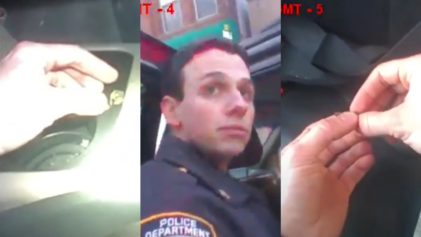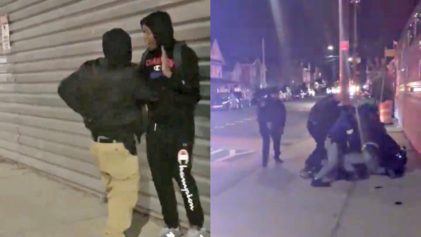In a remarkably unusual ruling, a federal appeals court threw the entire stop-and-frisk policing strategy into disarray by halting the sweeping changes that U.S. District Court Judge Shira Scheindlin had imposed on the New York Police Department in a landmark decision earlier this year.
The three-judge panel also accused Scheindlin of judicial misconduct and removed her from the case, handing a stunning victory to Mayor Michael Bloomberg and NYPD chief Ray Kelly just weeks before Bloomberg leaves office. Bloomberg and city officials had long complained that Scheindlin, who was overseeing three cases related to stop-and-frisk, was biased against the city and the NYPD.
Though it halted the effects of Scheindlin’s ruling, the Court of Appeals for the Second Circuit didn’t rule as yet on whether Scheindlin’s decision that stop-and-frisk violated the constitutional rights of the city’s Black and Hispanic residents was the correct conclusion.
“We intimate no view on the substance or merits of the pending appeals,” the panel said in the two-page order.
The appeals court appointed a new judge, John Koeltl, and instructed him to put off “all proceedings and otherwise await further action” from the panel. The judges said Scheindlin “ran afoul” of the judiciary’s code of conduct by compromising the “appearance of impartiality surrounding this litigation.” The panel also criticized how she had steered the lawsuit to her courtroom when it was filed nearly six years ago.
The reversal was a shocking and painful ruling for the city’s Black and Hispanic community and for the lawyers involved in the case.
Civil rights lawyer Jonathan C. Moore, who brought the case against the city, was stunned that the panel would remove Scheindlin.
“I think it’s a travesty of justice for this panel of the Second Circuit to take this case away from a judge who worked very hard for the last five years to resolve very important, serious issues involving the civil rights of the residents of New York,” Moore told the New York Times.
Lawyers said they would appeal the panel’s decision. But for now, Scheindlin’s changes are on hold. Those changes included installing an outside lawyer to monitor the police department’s compliance with the Constitution and directing some officers to wear cameras in a pilot program to record their street interactions. In addition, she had ordered the department to hold community meetings to solicit public comments on reforming the department’s tactics.
Scheindlin’s scathing decision in August lashed city officials who had “turned a blind eye” to evidence that officers carried out the searches in a “racially discriminatory manner,” violating individuals’ right to privacy and equal treatment under the law.
“In their zeal to defend a policy that they believe to be effective, they have willfully ignored overwhelming proof that the policy of singling out ‘the right people’ is racially discriminatory and therefore violates the United States Constitution,” the judge wrote.
Scheindlin wrote that the unconstitutional stops have exacted a “human toll” in demeaning and humiliating law-abiding citizens.
Between January 2004 and June 2012, the NYPD conducted 4.4 million stops, but just 6 percent resulted in arrests and 6 percent generated summonses. So in 88 percent of the 4.4 million stops, the person stopped was doing nothing wrong. And while more than half of all people stopped were frisked, only 1.5 percent of frisks uncovered weapons.
Blacks or Hispanics were stopped in 83 percent of the cases, although they make up just over half the population of the city.
City officials have continually argued that the racial disparity is justified because Blacks and Hispanics commit more crimes, but Scheindlin would have none of it.
“This reasoning is flawed because the stopped population is overwhelmingly innocent — not criminal,” she wrote. “There is no basis for assuming that an innocent population shares the same characteristics as the criminal suspect population in the same area.”
Bloomberg, who had ardently defended the program and even claimed that not enough Blacks and Hispanics were stopped, said after Scheindlin’s ruling that the city didn’t get a fair trial.
“The judge conveyed a disturbing disregard for the good intentions of our officers, who form the most diverse police department in the U.S.,” he said during a press conference. It was a “dangerous” decision by the judge, Bloomberg said, adding that the policy had helped lower crime in New York.
Police Commissioner Kelly had called the ruling “disturbing” and “highly offensive.”
While the city’s lawyers in their appeal had asked for a stay of Judge Scheindlin’s ruling and of the court-ordered mandates, the appeals court actually went beyond what the city had requested and unexpectedly ordered that the stop-and-frisk lawsuit, known as the Floyd case, be randomly reassigned.
The schedule for the appeals process will now extend into 2014, after Bloomberg is gone, so it’s not clear what will happen if Democratic candidate Bill de Blasio—expected to easily beat Republic Joe Lhota in next week’s election—takes office. De Blasio has been a vocal critic of stop-and-frisk.
De Blasio said he was “extremely disappointed” by the decision.
“We have to end the overuse of stop-and-frisk, and any delay only means a continued and unnecessary rift between our police and the people they protect,” de Blasio said in a statement.
But Lhota was clearly giddy about the ruling.
“As I have said all along, Judge Scheindlin’s biased conduct corrupted the case,” he said in a statement, adding that the next mayor “absolutely must continue this appeal.”
Commissioner Kelly called the ruling “an important decision for all New Yorkers.”
“I have always been — and certainly I haven’t been alone — concerned about the partiality of Judge Scheindlin,” Kelly said.
The three-judge panel — John M. Walker Jr, José A. Cabranes and Barrington D. Parker — even criticized Judge Scheindlin for granting media interviews and for making public statements while the case was before her. But in a statement she issued yesterday, Scheindlin said in her interviews with the media she always avoided talking about stop-and-frisk.
“Some of the reporters used quotes from written opinions in Floyd that gave the appearance that I had commented on the case,” the judge said. “However, a careful reading of each interview will reveal that no such comments were made.”


